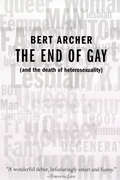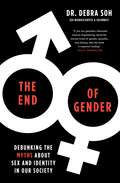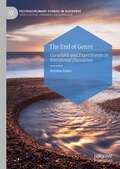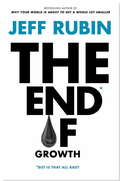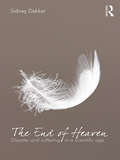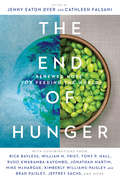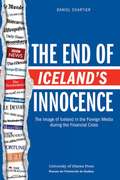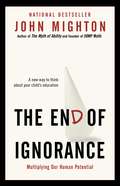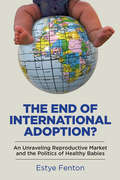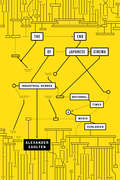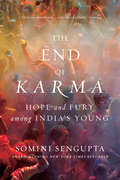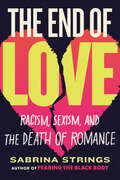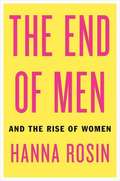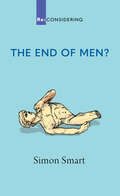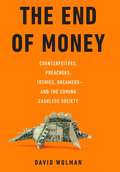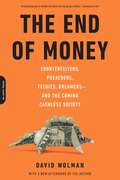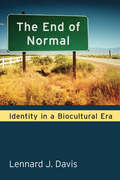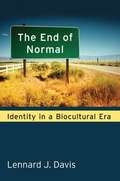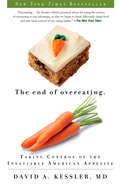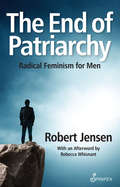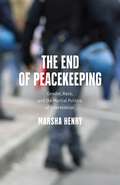- Table View
- List View
The End of Gay: (and the death of heterosexuality)
by Bert ArcherGay is a phase. Not something people go through in adolescence, but, like feminism, a cultural, historical movement, on the way to something bigger. Through the prism of his own sexual past and present, with a wide array of references to pop culture, literature and history, Archer traces the rise and imminent fall of gay. Along the way, he cites historical examples of greater sexual liberation, embracing the lessons of these precedents as models for our own less inhibited times. Celebrating art that expresses love and passion unfettered by gender, Archer claims Shakespeare and Prince, Goethe and Madonna, as icons for a new, more open age of sex. Stimulating, engaging and entertaining,The End of Gayis a bold work that looks forward to the vast possibilities of love without labels.
The End of Gender: Debunking the Myths about Sex and Identity in Our Society
by Debra SohInternational sex researcher, neuroscientist, and columnist Debra Soh debunks popular gender myths in this research-based, scientific examination of the many facets of gender identity.Is our gender something we&’re born with, or are we conditioned by society? In The End of Gender, neuroscientist and sexologist Dr. Debra Soh uses a research-based approach to address this hot-button topic, unmasking popular misconceptions about the nature vs. nurture debate and exploring what it means to be a woman or a man in today&’s society. Both scientific and objective, and drawing on original research and carefully conducted interviews, Soh tackles a wide range of issues, such as gender-neutral parenting, gender dysphoric children, and and the neuroscience of being transgender. She debates today&’s accepted notion that gender is a social construct and a spectrum, and challenges the idea that there is no difference between how male and female brains operate. The End of Gender is a conversation-starting work that will challenge what you thought you knew about gender, identity, and everything in between. Timely, informative, and provocative, it will arm you with the facts you need to come to your own conclusions about gender identity and its place in the world today.
The End of Genre: Curations and Experiments in Intentional Discourses (Postdisciplinary Studies in Discourse)
by Brenton FaberThis book explores early new critical debates about intention, tracing how and why intention was dismissed across much humanities scholarship, and how it can be revisited and made relevant as a key formative, evaluative, and ethical concept. The author argues that the academic disinterest in intention occurred simultaneously as genre criticism and later the rhetorical interest in genre came into its own. Genre became a way to simultaneously elide and naturalize intention. The book elaborates on the pedagogical, ethical, and empirical consequences naturalizing intention through genre has had for rhetorical studies and it offers a new term, “curations” to identify discursive forms, actions, and intentions working simultaneously. Finally, he also examines the gap between the humanities and STEM fields and shows specific ways scientists and engineers have called for the humanities to become more invested in intention as both a critical and an operational concept. This book will be of interest to students and scholars of discourse studies and critical discourse analysis, rhetoric and professional communication, including those in fields such as medicine, engineering, STS and business studies.
The End of Growth
by Jeff RubinIn an urgent follow-up to his best-selling Why Your World Is About To Get A Whole Lot Smaller, Jeff Rubin argues that the end of cheap oil means the end of growth. What it will be like to live in a world where growth is over? Economist and resource analyst Jeff Rubin is certain that the world's governments are getting it wrong. Instead of moving us toward economic recovery, measures being taken around the globe right now are digging us into a deeper hole. Both politicians and economists are missing the fact that the real engine of economic growth has always been cheap, abundant fuel and resources. But that era is over. The end of cheap oil, Rubin argues, signals the end of growth--and the end of easy answers to renewing prosperity. Rubin's own equation is clear: with China and India sucking up the lion's share of the world's ever more limited resources, the rest of us will have to make do with less. But is this all bad? Can less actually be more? Rubin points out that there is no research to show that people living in countries with hard-charging economies are happier, and plenty of research to show that some of the most contented people on the planet live in places with no-growth or slow-growth GDPs. But it doesn't matter whether it's bad or good, it's the new reality: our world is not only about to get smaller, our day-to-day lives are about to be a whole lot different.
The End of Heaven: Disaster and Suffering in a Scientific Age
by Sidney DekkerIn this unique book, Sidney Dekker tackles a largely unexplored dilemma. Our scientific age has equipped us ever better to explain why things go wrong. But this increasing sophistication actually makes it harder to explain why we suffer. Accidents and disasters have become technical problems without inherent purpose. When told of a disaster, we easily feel lost in the steely emptiness of technical languages of engineering or medicine. Or, in our drive to pinpoint the source of suffering, we succumb to the hunt for a scapegoat, possibly inflicting even greater suffering on others around us. How can we satisfactorily deal with suffering when the disaster that caused it is no more than the dispassionate sum of utterly mundane, imperfect human decisions and technical failures? Broad in its historical sweep and ambition, The End of Heaven is also Dekker's most personal book to date.
The End of Hunger: Renewed Hope for Feeding the World
by Cathleen Falsani Jenny Eaton Dyer2020 Foreword INDIES Book of the Year Award Finalists - Ecology and EnvironmentJesus' command is clear: we are called to feed all of God's children. But is that possible?The End of HungerChef Rick BaylessDavid BeasleyThe Rev. David BeckmannCongressman Diane BlackTony Campolo, PhDSenator Bob CorkerJeremy K. EverettCathleen FalsaniKimberly FlowersSenator William H. Frist, MDHelene Gayle, MDAmy GrantAmbassador Tony P. HallRudo Kwaramba-KayomboNikole LimJonathan MartinMike McHargueAngel F. Mendez Montoya, PhDWill MooreSamuel RodriguezJeffrey Sachs, PhDGabe SalgueroMark K. ShriverRon SiderRachel Marie StoneSteve Taylor and FamilyRoger ThurowElizabeth Uriyo and Christopher DelvaillKimberly Williams and Brad Paisley
The End of Iceland's Innocence: The Image of Iceland in the Foreign Media during the Financial Crisis
by Daniel ChartierIn the space of a few days, one of the world’s richest and most egalitarian nations, Iceland, toppled into financial chaos and sunk into an economic, ethical, moral and identity crisis. The vast empire built by Iceland’s young entrepreneurs, the “new Vikings”—who had propelled the country to the top of wealth, equality and happiness charts—collapsed under the combined effect of the failure of its banks and astronomical debt (more than ten times the country’s gross domestic product). Iceland became, in the midst of the global economic crisis, an icon of disaster that troubles all Western countries seeking to understand how the Scandinavian model could collapse so suddenly. In this book, Daniel Chartier traces, through thousands of articles appearing in the foreign press, the fascinating reversal of Iceland’s image during the crisis. Citizens of a country now humiliated, Icelanders must deal with a number of significant issues including the quest for wealth, sovereignty, ethics, responsibility, gender and the limits of neoliberalism.
The End of Ideology: On the Exhaustion of Political Ideas in the Fifties
by Daniel BellThese essay, in the main, deal with the social changes in the America of the fifties. It was a decade marked by extraordinary changes in the class structure, particularly in the growth of the white-collar class and the spread of suburbia; by the "forced" expansion of the economy, which belied earlier predictions of stagnation; by the creation of a permanent military establishment and a bedrock defense economy; and by the heightening tensions of the Cold War. In consequence, we have had the problem, abroad, of defining ourselves to Indians, Africans, Arabs, et al., and, at home, a preoccupation with "self" and "status" that has brought to the fore not only psychoanalysis but the mirror of popular sociology. The "restless vanity" of which de Tocqueville spoke, which made the American, in his intercourse with strangers, "impatient of the slightest censure and insatiable of praise," has been replaced by an anxious inferiority, fearful of censure and desperately eager to please.
The End of Ignorance: Multiplying Our Human Potential
by John MightonA revolutionary call for a new understanding of how people learn. The End of Ignorance conceives of a world in which no child is left behind -- a world based on the assumption that each child has the potential to be successful in every subject. John Mighton argues that by recognizing the barriers that we have experienced in our own educational development, by identifying the moment that we became disenchanted with a certain subject and forever closed ourselves off to it, we will be able to eliminate these same barriers from standing in the way of our children. A passionate examination of our present education system, The End of Ignorance shows how we all can work together to reinvent the way that we are taught.John Mighton, the author of The Myth of Ability, is the founder of JUMP Math, a system of learning based on the fostering of emergent intelligence. The program has proved so successful an entire class of Grade 3 students, including so-called slow learners, scored over 90% on a Grade 6 math test. A group of British children who had effectively been written off as too unruly responded so enthusiastically and had such impressive results using the JUMP method that the school board has adopted the program. Inspired by the work he has done with thousands of students, Mighton shows us why we must not underestimate how much ground can be covered one small step at a time, and challenges us to re-examine the assumptions underlying current educational theory. He pays attention to how kids pay attention, chronicles what captures their imaginations, and explains why their sense of self-confidence and ability to focus are as important to their academic success at school as the content of their lessons.
The End of International Adoption?: An Unraveling Reproductive Market and the Politics of Healthy Babies (Families in Focus)
by Estye FentonSince 2004, the number of international adoptions in the United States has declined by more than seventy percent. In The End of International Adoption? Estye Fenton studies parents in the United States who adopted internationally in the past decade during this shift. She investigates the experiences of a cohort of adoptive mothers who were forced to negotiate their desire to be parents in the context of a growing societal awareness of international adoption as a flawed reproductive marketplace. Many parents, activists, and scholars have questioned whether the inequality inherent in international adoption renders the entire system suspect. In the face of such concerns, international adoption has not only become more difficult, but also more politically and ethically fraught. The mothers interviewed for this book found themselves navigating contemporary American family life in an unexpected way, caught between the double-bind of work-family life and a new paradigm of thinking about the method—international adoption—that they used to create those families.
The End of Japanese Cinema: Industrial Genres, National Times, and Media Ecologies
by Alexander ZahltenIn The End of Japanese Cinema Alexander Zahlten moves film theory beyond the confines of film itself, attending to the emergence of new kinds of aesthetics, politics, temporalities, and understandings of film and media. He traces the evolution of a new media ecology through deep historical analyses of the Japanese film industry from the 1960s to the 2000s. Zahlten focuses on three popular industrial genres: Pink Film (independently distributed softcore pornographic films), Kadokawa (big-budget productions as part of a transmedia strategy), and V-Cinema (direct-to-video films). He examines the conditions of these films' production to demonstrate how the media industry itself becomes part of the politics of the media text and to highlight the complex negotiation between media and politics, culture, and identity in Japan. Zahlten points to a different history of film, one in which a once-powerful film industry transformed into becoming only one component within a complex media-mix ecology. In so doing, Zahlten opens new paths for uncovering similar broad processes in other large media societies. A Study of the Weatherhead East Asian Institute, Columbia University
The End of Karma: Hope and Fury Among India's Young
by Somini SenguptaA penetrating, personal look at contemporary India--the world's largest democracy at a moment of transition. Somini Sengupta emigrated from Calcutta to California as a young child in 1975. Returning thirty years later as the bureau chief for The New York Times, she found a vastly different country: one defined as much by aspiration and possibility--at least by the illusion of possibility--as it is by the structures of sex and caste. The End of Karma is an exploration of this new India through the lens of young people from different worlds: a woman who becomes a Maoist rebel; a brother charged for the murder of his sister, who had married the "wrong" man; a woman who opposes her family and hopes to become a police officer. Driven by aspiration--and thwarted at every step by state and society--they are making new demands on India's democracy for equality of opportunity, dignity for girls, and civil liberties. Sengupta spotlights these stories of ordinary men and women, weaving together a groundbreaking portrait of a country in turmoil.
The End of Love: Racism, Sexism, and the Death of Romance
by Sabrina StringsFrom Playboy to Jay-Z, the racial origins of toxic masculinity and its impact on women, especially Black and &“insufficiently white&” womenMore men than ever are refusing loving partnerships and commitment, and instead seeking out &“situationships.&” When these men deign to articulate what they are looking for in a steady partner, they&’ll often rely on superficial norms of attractiveness rooted in whiteness and anti-Blackness.Connecting the past to the present, sociologist Sabrina Strings argues that following the Civil Rights movement and the integration of women during the Second Wave Feminist movement, men aimed to hold on to their power by withholding love and commitment, a basic tenet of white supremacy and male domination, that served to manipulate all women. From pornography to hip hop, women—especially Black and &“insufficiently white&” women—were presented as gold diggers, props for masturbation, and side-pieces.Using historical research, personal stories, and critical analysis, Strings argues that the result is fuccboism, the latest incarnation of toxic masculinity. This work shows that men are not innately &“toxic.&” Nor do they hate love, commitment, or sex. Instead, men across race have been working a new code to effectively deny loving partnerships to women who are not pliant, slim, and white as a new mode of male domination.
The End of Men: And the Rise of Women
by Hanna RosinWhat Betty Friedan, Simone de Beauvoir, Susan Faludi and Naomi Wolf did for feminism, senior editor of The Atlantic Hanna Rosin does for a new generation of women: an explosive new argument for why women are winning the battle of the sexes and why men are no longer top dog. Women are no longer catching up with men. By almost every measure, they are out performing them. We are at a turning point in history. In 2010, for the first time, the balance of the British workforce tipped towards women, who now hold around half of the nation's jobs. In the US, meanwhile, for every two men that receive a BA, three women will achieve the same. Not only do women dominate colleges and professional schools on every continent except Africa, young single women earn more than men in the US, and more than a third of mothers in the UK and the US are their family's main breadwinner. The tides have turned. The 'age of testosterone' is decisively over. At almost every level of society women are proving themselves far more adaptable and suited to a job market that rewards people skills and intelligence, and a world that has a dramatically diminishing need for traditional male muscle. In this landmark, once-in-a-generation book, Hanna Rosin reveals how this new world order came to be and its great implications for marriage, sex, children, work, families and society. Unhampered by old assumptions and ideologies and drawing on examples from across the globe, The End of Men helps us see how both men and women can - and must - adapt for a radically new era. '[Its strength] lies in the nuanced portraits Rosin draws of people trying to grapple with new currents of power, to assimilate political and economic change in their living rooms and trailers' FT Weekend'In this bold and inspired dispatch, Rosin upends the common platitudes of contemporary sexual politics with a deeply reported meditation from the unexpected frontiers of our rapidly changing culture' Katie Roiphe, author of The Morning After and Uncommon Arrangements'The End of Men describes a new paradigm that can, finally, take us beyond 'winners' and 'losers' in an endless 'gender war. ' What a relief! Ultimately, Rosin's vision is both hope-filled and creative, allowing both sexes to become far more authentic: as workers, partners, parents. . . and people' Peggy Orenstein, author of Cinderella Ate My Daughter and SchoolgirlsHanna Rosin is a senior editor at The Atlantic magazine and a founder and co-editor of DoubleX, Slate's women's section. She has written for the New Yorker, The New York Times, GQ, and The New Republic, and for a number of years covered politics and religion for the Washington Post. In 2009 she was nominated for a National Magazine Award, and in 2010 she won one. She is the author of a previous book, God's Harvard: A Christian College on a Mission to Save America. Rosin lives in Washington, DC, with her husband, Slate editor David Plotz, and their three children.
The End of Men? (Re: CONSIDERING)
by Simon SmartRe:CONSIDERING invites you to look at what’s familiar from an unfamiliar angle. To consider how we consider things – and how to do it better.What makes a good man?In this grounded, forthright and hopeful book, Simon Smart reconsiders the modern male dilemma.Models of masculinity may be less constricting than they used to be – but boys and men are confused about what’s expected of them, and it shows. In education, in mental health, in relationships, they’re struggling. And we’re all struggling to have a constructive conversation about the challenges they face.Drawing on his own experiences of schooling and fatherhood, the best contemporary research, interviews with those on the front lines of a growing crisis, as well as ancient wisdom, Simon Smart asks the question: how can we help boys become their best selves, and a gift to those around them?
The End of Money
by David WolmanTraveling the world to study the story of cash, Wired magazine contributing editor David Wolman explores the future of currency and what its imminent demise might mean for technology and people around the globe. The author talks to counterfeiters, coin collectors, bankers, and transaction technology gurus, examining the social, economic, and political ramifications of a world moving away from tangible currency. The work is engaging and well written and will appeal to general readers with an interest in the social consequences of technology. Annotation ©2012 Book News, Inc. , Portland, OR (booknews. com)
The End of Money
by David WolmanFor ages, money has meant little metal disks and rectangular slips of paper. Yet the usefulness of physical money--to say nothing of its value--is coming under fire as never before. Intrigued by the distinct possibility that cash will soon disappear, author and Wired contributing editor David Wolman sets out to investigate the future of money...and how it will affect your wallet. Wolman begins his journey by deciding to shun cash for an entire year--a surprisingly successful experiment (with a couple of notable exceptions). He then ventures forth to find people and technologies that illuminate the road ahead. In Honolulu, he drinks Mai Tais with Bernard von NotHaus, a convicted counterfeiter and alternative-currency evangelist whom government prosecutors have labeled a domestic terrorist. In Tokyo, he sneaks a peek at the latest anti-counterfeiting wizardry, while puzzling over the fact that banknote forgers depend on society's addiction to cash. In a downtrodden Oregon town, he mingles with obsessive coin collectors--the people who are supposed to love cash the most, yet don't. And in rural Georgia, he examines why some people feel the end of cash is Armageddon's warm-up act. After stops at the Digital Money Forum in London and Iceland's central bank, Wolman flies to Delhi, where he sees first-hand how cash penalizes the poor more than anyone--and how mobile technologies promise to change that. Told with verve and wit, The End of Money explores an aspect of our daily lives so fundamental that we rarely stop to think about it. You'll never look at a dollar bill the same again.
The End of Money: Counterfeiters, Preachers, Techies, Dreamers--and the Coming Cashless Society
by David WolmanFor ages, money has meant little metal disks and rectangular slips of paper. Yet the usefulness of physical money--to say nothing of its value--is coming under fire as never before. Intrigued by the distinct possibility that cash will soon disappear, author and Wired contributing editor David Wolman sets out to investigate the future of money...and how it will affect your wallet. Wolman begins his journey by deciding to shun cash for an entire year--a surprisingly successful experiment (with a couple of notable exceptions). He then ventures forth to find people and technologies that illuminate the road ahead. In Honolulu, he drinks Mai Tais with Bernard von NotHaus, a convicted counterfeiter and alternative-currency evangelist whom government prosecutors have labeled a domestic terrorist. In Tokyo, he sneaks a peek at the latest anti-counterfeiting wizardry, while puzzling over the fact that banknote forgers depend on society's addiction to cash. In a downtrodden Oregon town, he mingles with obsessive coin collectors--the people who are supposed to love cash the most, yet don't. And in rural Georgia, he examines why some people feel the end of cash is Armageddon's warm-up act. After stops at the Digital Money Forum in London and Iceland's central bank, Wolman flies to Delhi, where he sees first-hand how cash penalizes the poor more than anyone--and how mobile technologies promise to change that. Told with verve and wit, The End of Money explores an aspect of our daily lives so fundamental that we rarely stop to think about it. You'll never look at a dollar bill the same again.
The End of Nomadism?: Society, State, and the Environment in Inner Asia
by Caroline Humphrey David Andrews SneathThose who herd in the vast grassland region of Inner Asia face a precarious situation as they struggle to respond to the momentous political and economic changes of recent years. In The End of Nomadism? Caroline Humphrey and David Sneath confront the romantic, ahistorical myth of the wandering nomad by revealing the complex lives and the significant impact on Asian culture of these modern "mobile pastoralists." In their examination of the present and future of pastoralism, the authors recount the extensive and quite sudden social, political, environmental, and economic changes of recent years that have forced these peoples to respond and evolve in order to maintain their centuries-old way of life. Using extensive and detailed case studies comparing pastoralism in Siberian Russia, Mongolia, and Northwest China, Humphrey and Sneath explore the different paths taken by nomads in these countries in reaction to a changing world. In examining how each culture is facing not only different prospects for sustainability but also different environmental problems, the authors come to the surprising conclusion that mobility can, in fact, be compatible with a modern and urbanized world. While placing emphasis on the social and cultural traditions of Inner Asia and their fate in the post-Socialist economies of the present, The End of Nomadism? investigates the changing nature of pastoralism by focusing on key areas under environmental threat and relating the ongoing problems to distinctive socioeconomic policies and practices in Russia and China. It also provides lively contemporary commentary on current economic dilemmas by revealing in telling detail, for instance, the struggle of one extended family to make a living. This book will interest Central Asian, Russian, and Chinese specialists, as well as those studying the environment, anthropology, sociology, peasant studies, and ecology.
The End of Normal: Identity in a Biocultural Era
by Lennard DavisIn an era when human lives are increasingly measured and weighed in relation to the medical and scientific, notions of what is "normal" have changed drastically. While it is no longer useful to think of a person's particular race, gender, sexual orientation, or choice as "normal," the concept continues to haunt us in other ways. In The End of Normal, Lennard J. Davis explores changing perceptions of body and mind in social, cultural, and political life as the twenty-first century unfolds. The book's provocative essays mine the worlds of advertising, film, literature, and the visual arts as they consider issues of disability, depression, physician-assisted suicide, medical diagnosis, transgender, and other identities. Using contemporary discussions of biopower and biopolitics, Davis focuses on social and cultural production--particularly on issues around the different body and mind. The End of Normal seeks an analysis that works comfortably in the intersection between science, medicine, technology, and culture, and will appeal to those interested in cultural studies, bodily practices, disability, science and medical studies, feminist materialism, psychiatry, and psychology.
The End of Normal: Identity in a Biocultural Era
by Lennard J. DavisIn The End of Normal, Lennard J. Davis explores changing perceptions of body and mind in social, cultural, and political life as the twenty-first century unfolds. The book’s provocative essays mine the worlds of advertising, film, literature, and the visual arts as they consider issues of disability, depression, physician-assisted suicide, medical diagnosis, transgender, and other identities.
The End of Overeating: Taking Control of the Insatiable American Appetite
by David A. KesslerDr. David A. Kessler, the dynamic and controversial former FDA commissioner known for his crusade against the tobacco industry, is taking on another business that's making Americans sick: the food industry. In The End of Overeating, Dr. Kessler shows us how our brain chemistry has been hijacked by the foods we most love to eat: those that contain stimulating combinations of fat, sugar, and salt.Drawn from the latest brain science as well as interviews with top physicians and food industry insiders, The End of Overeating exposes the food industry's aggressive marketing tactics and reveals shocking facts about how we lost control over food—and what we can do to get it back. For the millions of people struggling with their weight as well as those of us who simply can't seem to eat our favorite foods in moderation, Dr. Kessler's cutting-edge investigation offers valuable insights and practical answers for America's largest-ever public health crisis. There has never been a more thorough, compelling, or in-depth analysis of why we eat the way we do.
The End of Ownership: Personal Property in the Digital Economy (The Information Society Series)
by Aaron Perzanowski Jason SchultzAn argument for retaining the notion of personal property in the products we “buy” in the digital marketplace. If you buy a book at the bookstore, you own it. You can take it home, scribble in the margins, put in on the shelf, lend it to a friend, sell it at a garage sale. But is the same thing true for the ebooks or other digital goods you buy? Retailers and copyright holders argue that you don't own those purchases, you merely license them. That means your ebook vendor can delete the book from your device without warning or explanation—as Amazon deleted Orwell's 1984 from the Kindles of surprised readers several years ago. These readers thought they owned their copies of 1984. Until, it turned out, they didn't. In The End of Ownership, Aaron Perzanowski and Jason Schultz explore how notions of ownership have shifted in the digital marketplace, and make an argument for the benefits of personal property.Of course, ebooks, cloud storage, streaming, and other digital goods offer users convenience and flexibility. But, Perzanowski and Schultz warn, consumers should be aware of the tradeoffs involving user constraints, permanence, and privacy. The rights of private property are clear, but few people manage to read their end user agreements. Perzanowski and Schultz argue that introducing aspects of private property and ownership into the digital marketplace would offer both legal and economic benefits. But, most important, it would affirm our sense of self-direction and autonomy. If we own our purchases, we are free to make whatever lawful use of them we please. Technology need not constrain our freedom; it can also empower us.
The End of Patriarchy: Radical Feminism for Men
by Robert JensenThe End of Patriarchy asks one key question: what do we need to create stable and decent human communities that can thrive in a sustainable relationship with the larger living world? Robert Jensen's answer is feminism and a critique of patriarchy. He calls for a radical feminist challenge to institutionalized male dominance; an uncompromising rejection of men's assertion of a right to control women's sexuality; and a demand for an end to the violence and coercion that are at the heart of all systems of domination and subordination. The End of Patriarchy makes a powerful argument that a socially just society requires no less than a radical feminist overhaul of the dominant patriarchal structures.
The End of Peacekeeping: Gender, Race, and the Martial Politics of Intervention
by Marsha HenryIn The End of Peacekeeping, Marsha Henry makes use of feminist, postcolonial, and anti-militarist frameworks to expose peacekeeping as an epistemic power project in need of abolition. Drawing on critical concepts from Black feminist thought, and from postcolonial and critical race theories, Henry shows how contemporary peacekeeping produces gender and racial inequalities through increasingly militarized strategies.The book’s intersectional analysis of peacekeeping is based on data amassed through more than fifteen years of ethnographic fieldwork on peacekeeping missions and training centers around the world, including interviews with UN peacekeepers, humanitarian aid personnel, and local populations. Henry demonstrates how focus on the policy and practice of peacekeeping has obscured the geopolitical knowledge project at peacekeeping’s root, allowing its harms to persist unquestioned by mainstream scholarship. Arguing that we must recover critical theoretical contributions that have been sidelined within the field, she brings the insights of feminist and postcolonial scholarship to bear on peacekeeping studies, whose production of empirical data and evidence continues to provide the justification and foundation for policy and global governance actions.Revealing that peacekeeping is not the benign, apolitical project it is often purported to be, this book encourages readers to imagine and enact alternative futures to peacekeeping.
